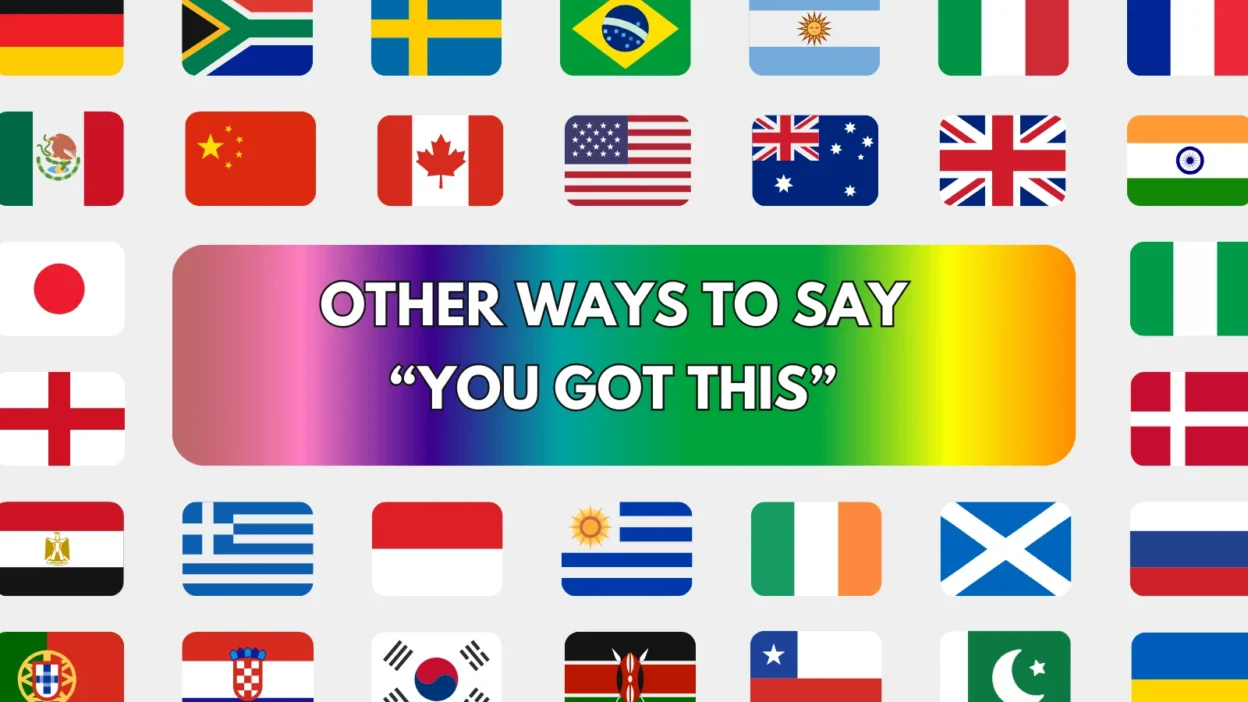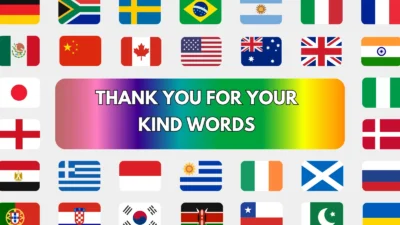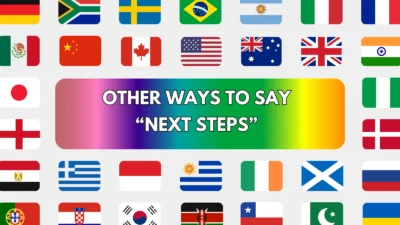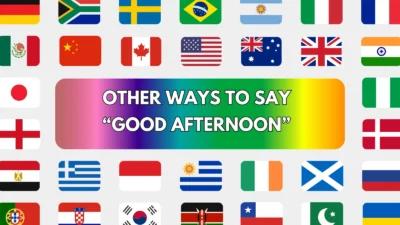The phrase “You got this” is a popular and uplifting way to offer support and encouragement. Whether someone is facing a challenge, starting something new, or simply needs a boost, it’s a go-to expression to say “I believe in you.” However, using a variety of alternatives can make your support feel more personal, meaningful, and suited to different tones and situations.
Here are 25 impactful alternatives to “You Got This”, each with thoughtful explanations and examples to help you motivate others with confidence and care.
1. You Can Do It
Meaning:
A direct way to express belief in someone’s ability to succeed.
Detailed Explanation:
It’s a classic motivational phrase that offers clear, enthusiastic support.
Scenario Example:
Don’t worry about the interview — you can do it!
Best Use:
Casual encouragement, pep talks.
Tone:
Supportive, energetic.
2. Believe in Yourself
Meaning:
A reminder that self-confidence is key to success.
Detailed Explanation:
This phrase encourages internal belief rather than external approval.
Scenario Example:
You’ve prepared for this moment — believe in yourself and shine.
Best Use:
Personal messages, self-growth support.
Tone:
Empowering, gentle.
3. Go for It
Meaning:
An enthusiastic push to take action or try something new.
Detailed Explanation:
Casual and energetic, often used to cheer someone on.
Scenario Example:
You’ve been thinking about that job — go for it!
Best Use:
Friends, informal chats.
Tone:
Lively, encouraging.
4. You’ve Got What It Takes
Meaning:
Reassures someone that they have the skills and strength to succeed.
Detailed Explanation:
More specific than “You got this,” this phrase focuses on a person’s capabilities.
Scenario Example:
The exam’s tough, but you’ve got what it takes.
Best Use:
Mentorship, school or work encouragement.
Tone:
Confident, reassuring.
5. I Believe in You
Meaning:
A personal expression of trust and confidence in someone’s abilities.
Detailed Explanation:
This phrase adds emotional weight by showing your personal support.
Scenario Example:
Even if you doubt yourself, I believe in you.
Best Use:
Close relationships, emotional support.
Tone:
Warm, heartfelt.
6. Crush It
Meaning:
A slang expression meaning to perform extremely well.
Detailed Explanation:
Trendy and bold, it’s often used before sports, interviews, or performances.
Scenario Example:
You’ve done all the prep — now go crush it!
Best Use:
Text messages, casual motivation.
Tone:
Excited, confident.
7. Knock It Out of the Park
Meaning:
Encourages someone to exceed expectations and achieve great success.
Detailed Explanation:
This sports metaphor (baseball) implies complete success with flair.
Scenario Example:
Your pitch is solid — go knock it out of the park!
Best Use:
Work or school presentations, big moments.
Tone:
Playful, motivational.
8. You’re Ready for This
Meaning:
Affirms that someone is well-prepared and capable.
Detailed Explanation:
Emphasizes preparation and timing, great for calming nerves.
Scenario Example:
Don’t second-guess it — you’re ready for this.
Best Use:
Before interviews, tests, or public speaking.
Tone:
Calm, confident.
9. You’ve Got This in the Bag
Meaning:
Suggests an outcome is already secured due to preparation or skill.
Detailed Explanation:
Casual and a bit cheeky, but full of confidence.
Scenario Example:
Your speech is flawless — you’ve got this in the bag.
Best Use:
Lighthearted encouragement.
Tone:
Confident, relaxed.
10. Give It Your Best Shot
Meaning:
Encourages someone to try their hardest, regardless of outcome.
Detailed Explanation:
It’s about effort, not just success — great for easing pressure.
Scenario Example:
Just give it your best shot — that’s all anyone can ask.
Best Use:
When someone feels nervous or unsure.
Tone:
Supportive, gentle.
11. You’ve Come So Far — Keep Going
Meaning:
Motivates someone to continue despite challenges.
Detailed Explanation:
Focuses on progress already made, boosting determination.
Scenario Example:
You’ve come so far — keep going, you’re nearly there.
Best Use:
Ongoing projects, emotional support.
Tone:
Encouraging, reflective.
12. You’re Stronger Than You Think
Meaning:
Reassures someone that they have untapped strength or resilience.
Detailed Explanation:
Ideal during emotionally difficult or challenging times.
Scenario Example:
It’s tough now, but you’re stronger than you think.
Best Use:
Mental health encouragement.
Tone:
Empowering, compassionate.
13. Don’t Doubt Yourself
Meaning:
A reminder to stay confident and avoid self-sabotage.
Detailed Explanation:
Helpful when someone is hesitating or questioning their abilities.
Scenario Example:
You’ve trained for this — don’t doubt yourself.
Best Use:
Before high-pressure situations.
Tone:
Firm, encouraging.
14. You’re Going to Nail It
Meaning:
Assures someone that they’ll do great.
Detailed Explanation:
Slang-style motivation with casual confidence.
Scenario Example:
Big meeting today? You’re going to nail it.
Best Use:
Work chats, pre-performance support.
Tone:
Cheerful, modern.
15. Trust Yourself
Meaning:
Encourages someone to have faith in their instincts and decisions.
Detailed Explanation:
Perfect for situations where hesitation is holding someone back.
Scenario Example:
You know what to do — trust yourself.
Best Use:
Decision-making, crossroads moments.
Tone:
Empowering, quiet confidence.
16. Keep Pushing Forward
Meaning:
Motivates someone to continue striving despite obstacles.
Detailed Explanation:
Focuses on perseverance and long-term goals.
Scenario Example:
The journey’s hard, but keep pushing forward — you’re getting closer.
Best Use:
During long-term struggles.
Tone:
Resilient, determined.
17. Rise to the Challenge
Meaning:
Encourages someone to meet difficulty with courage and skill.
Detailed Explanation:
Useful in professional or competitive environments.
Scenario Example:
It’s a big task, but I know you’ll rise to the challenge.
Best Use:
Workplace, sports, academics.
Tone:
Inspiring, bold.
18. Go Make It Happen
Meaning:
Tells someone to take charge and turn goals into reality.
Detailed Explanation:
Motivational and proactive — ideal for ambitious situations.
Scenario Example:
You’ve got the vision — now go make it happen!
Best Use:
Entrepreneurship, project launches.
Tone:
Driven, empowering.
19. Step Into Your Power
Meaning:
Encourages someone to embrace their abilities and confidence.
Detailed Explanation:
Great for empowering people who are undervaluing themselves.
Scenario Example:
Stop holding back — step into your power and own it.
Best Use:
Self-growth, empowerment conversations.
Tone:
Inspiring, bold.
20. Keep Believing
Meaning:
A gentle push to maintain hope and confidence.
Detailed Explanation:
Soft and sincere — ideal when someone is close to giving up.
Scenario Example:
It’s tough, but keep believing — good things take time.
Best Use:
Emotional support, long journeys.
Tone:
Hopeful, gentle.
21. Bring Your Best Self
Meaning:
Encourages authenticity and effort.
Detailed Explanation:
Good for setting a positive tone before events or opportunities.
Scenario Example:
Tomorrow’s a big day — bring your best self!
Best Use:
Job interviews, speaking engagements.
Tone:
Uplifting, positive.
22. It’s Your Time to Shine
Meaning:
Acknowledges someone’s readiness and potential for success.
Detailed Explanation:
Often used before big moments like performances or interviews.
Scenario Example:
You’ve worked hard — it’s your time to shine!
Best Use:
Celebratory encouragement.
Tone:
Proud, uplifting.
23. You’re Capable of Amazing Things
Meaning:
Reminds someone of their potential to do great things.
Detailed Explanation:
Broader than a single event — focuses on their future, too.
Scenario Example:
Don’t limit yourself — you’re capable of amazing things.
Best Use:
Long-term motivation.
Tone:
Affirming, inspiring.
24. You’ve Worked Hard for This
Meaning:
Acknowledges the effort someone has already put in.
Detailed Explanation:
This builds confidence by reminding them they’ve earned their opportunity.
Scenario Example:
Don’t be nervous — you’ve worked hard for this moment.
Best Use:
Before events, rewards, exams.
Tone:
Respectful, motivating.
25. You’re Going to Do Great
Meaning:
A confident prediction of someone’s success.
Detailed Explanation:
A soft and kind alternative that’s supportive without pressure.
Scenario Example:
First day on the job? You’re going to do great.
Best Use:
Personal and professional support.
Tone:
Reassuring, warm.
Conclusion
Saying “You got this” is a powerful way to uplift someone — but using different words can make your message more memorable, heartfelt, or specific. Whether you’re encouraging a friend, student, coworker, or family member, these 25 thoughtful alternatives help you support others with authenticity and style.

Hadi Bhatti is a passionate writer and content creator at Saypadia, known for turning complex words, phrases, and internet slang into simple, easy-to-understand explanations. With a strong interest in language, meanings, and digital communication, Hadi focuses on helping readers understand what words really mean in everyday use. His writing style is clear, engaging, and user-focused, making learning both practical and enjoyable.




